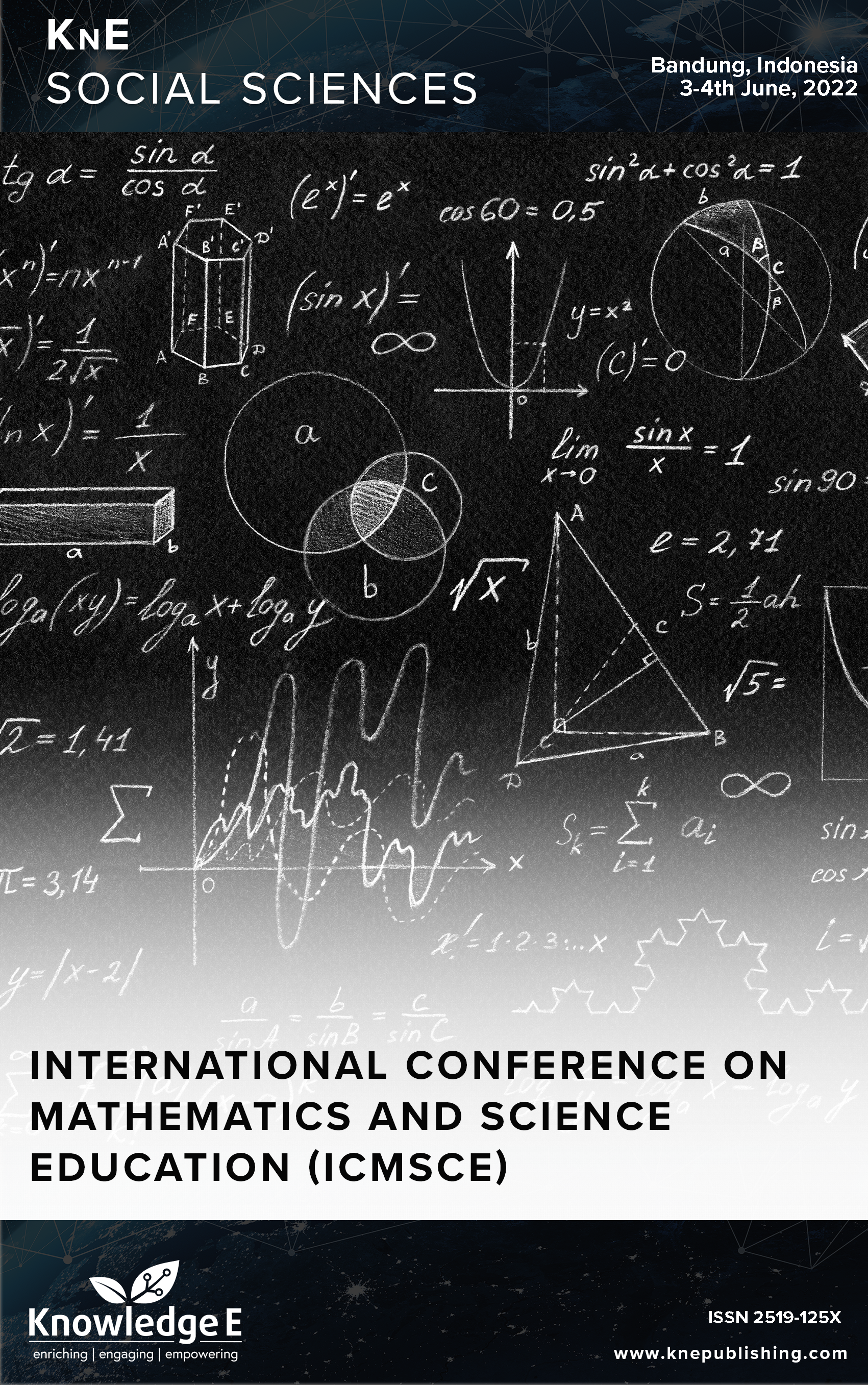Students' Perceptions in Developing Authentic Assessment with Website Integrated to Measure Physics Learning Outcomes: A Need Analysis
DOI:
https://doi.org/10.18502/kss.v9i8.15636Abstract
Assessment is one of the crucial roles in measuring student abilities to face challenges of the 21st century. This study examines how college students’ ambitions influence their perceptions and desires for authentic assessment, based on website development. Data series via interviews and closed query questionnaires were given to 131 high school students within the metropolis of Surakarta. Facts analysis used a qualitative method with descriptive strategies. The findings of this look suggest that 64% of 130 senior high school students find it tough to clear up physics questions. Students experience that they consider physics issues harder to resolve than the equations that have been memorized. Students want within the evaluation, they have experienced those actual troubles within the learning system so that the ability to understand principles, abilities, and attitudes can be higher. Therefore, it is far essential to expand real assessment as an incorporated device between getting to know and evaluation of getting to know to degree physics learning outcomes.
Keywords: authentic assessment, website integrated, physics learning outcomes
References
Kim S, Raza M, Seidman E. Improving 21st-century teaching skills: the key to effective 21st-century learners. Res Comp Int Educ. 2019;14(1):99–117. DOI: https://doi.org/10.1177/1745499919829214
Batlolona JR, Baskar C, Kurnaz MA, Leasa M. The improvement of problem-solving skills and physics concept mastery on temperature and heat topic. Jurnal Pendidikan IPA Indonesia. 2018;7(3):273–9. DOI: https://doi.org/10.15294/jpii.v7i3.12432
Saragih S, Zulkarnain SN. “The impact of learning model based on 2013 curriculum towards contextual problem solving skill.,” In: MSCEIS 2019: Proceedings of the 7th Mathematics, Science, and Computer Science Education International Seminar, MSCEIS 2019. pp. 231. West Java, Bandung (2020). DOI: https://doi.org/10.4108/eai.12-10-2019.2296290
Hsu YS, Yeh YF. Asia-Pacific STEM Teaching Practices. Singapore: Springer; 2019. https://doi.org/10.1007/978-981-15-0768-7. DOI: https://doi.org/10.1007/978-981-15-0768-7
Rustaman NY. Assessment in science education. J Phys Conf Ser. 2017;895(1):12141. DOI: https://doi.org/10.1088/1742-6596/895/1/012141
Maruf M, Rahim AL. Pengembangan perangkat penilaian autentik dalam pembelajaran fisika untuk meningkatkan motivasi, partisipasi dan hasil belajar fisika siswa kelas x sma negeri 1 pangkajene. Jurnal Pendidikan Fisika. 2013;1(3):252–63.
Lindawati L, Saregar A, Yuberti Y. “Pengembangan instrumen authentic assessment untuk mengukur higher order thinking skills peserta didik.,” In: Seminar Nasional Pendidikan. pp. 140–149 (2016).
Kurniawati A, Sukardiyono S. The development of authentic assessment instrument to measure science process skill and achievement based on students’ performance.Jurnal Penelitian & Pengembangan Pendidikan Fisika. 2018;4(2):65–74. DOI: https://doi.org/10.21009/1.04203
Anggraheni NN, Sriyono S, Ngazizah N. Pengembangan instrumen penilaian autentik untuk mengukur sikap sosial peserta didik SMA kelas X pada pembelajaran fisika. Radiasi: Jurnal Berkala Pendidikan Fisika. 2015;7(2):1–6.
R. Rabiudin, E. Taruh, and Mursalin, “Development of authentic affective assessment instrument in high school physics learning.,” Journal of Physics: Conference Series. vol. 1028, no. 1, p. 2018. DOI: https://doi.org/10.1088/1742-6596/1028/1/012201
Zhang D, Zhou L, Briggs RO, Nunamaker JF Jr. Instructional video in e-learning: assessing the impact of interactive video on learning effectiveness. Inf Manage. 2006;43(1):15–27. DOI: https://doi.org/10.1016/j.im.2005.01.004
Yusuf I, Widyaningsih SW. Implementing e-learning-based virtual laboratory media to students’ metacognitive skills. Int J Emerg Technol Learn. 2020;15(5):63–74. DOI: https://doi.org/10.3991/ijet.v15i05.12029
Grant J. Learning needs assessment: assessing the need. BMJ. 2002 Jan;324(7330):156–9. DOI: https://doi.org/10.1136/bmj.324.7330.156
Kozikoglu I. Investigating critical thinking in prospective teachers: metacognitive skills, problem solving skills and academic self-efficacy. Journal of Social Studies Education Research. 2019;10(2):111–30.
Crisan C, Pavelea A, Ghimbulut O. A need assessment on students’ career guidance. Procedia Soc Behav Sci. 2015;180:1022–9. DOI: https://doi.org/10.1016/j.sbspro.2015.02.196
Abdullah M. Pengantar fisika statistik untuk mahasiswa. Bandung: Penerbit ITB; 2007.
Diyana TN, Sutopo S, Sunaryono S. The effectiveness of web-based recitation program on improving students conceptual understanding in fluid mechanics. Jurnal Pendidikan IPA Indonesia. 2020;9(2):219–30. DOI: https://doi.org/10.15294/jpii.v9i2.24043
Suarez A, Kahan S, Zavala G, Marti AC. Students’ conceptual difficulties in hydrodynamics. Phys Rev Phys Educ Res. 2017;13(2):20132. DOI: https://doi.org/10.1103/PhysRevPhysEducRes.13.020132
Kristian PL, Cari C, Sunarno W. The analysis of the mathematics concept comprehension of senior high school student on dynamic fluid material. J Phys Conf Ser. 2018;1006(1):12028. DOI: https://doi.org/10.1088/1742-6596/1006/1/012028
Widarti HR, Rokhim DA, Syafruddin AB. The development of electrolysis cell teaching material based on stem-pjbl approach assisted by learning video: A need analysis. Jurnal Pendidikan IPA Indonesia. 2020;9(3):309–18. DOI: https://doi.org/10.21070/pedagogia.v9i2.736
Jayadi K, Abduh A. Current changes in digital anthropology and literacy in higher education. International Journal of Innovation, Creativity and Change. 2020;11(1):482–9.
Poikela E. Developing criteria for knowing and learning at work: towards context?based assessment. J Workplace Learn. 2004;16(5):267–74. DOI: https://doi.org/10.1108/13665620410545543
Azizah R, Yuliati L, Latifah E. “Kesulitan pemecahan masalah fisika pada siswa SMA.,” Jurnal Penelitian Fisika dan Aplikasinya ( JPFA). vol. 5, no. 2, pp. 44–50, 2015. https://doi.org/10.26740/jpfa.v5n2.p44-50. DOI: https://doi.org/10.26740/jpfa.v5n2.p44-50
Engelhardt PV, Robinson S, Price EP, Smith PS, Goldberg F. “Developing a conceptual assessment for a modular curriculum.,” In: Physics Education Research Conference (2018).
Besson U. Students’ conceptions of fluids. Int J Sci Educ. 2004;26(14):1683–714. DOI: https://doi.org/10.1080/0950069042000243745
Chu HE, Treagust DF, Yeo S, Zadnik M. Evaluation of students’ understanding of thermal concepts in everyday contexts. Int J Sci Educ. 2012;34(10):1509–34. DOI: https://doi.org/10.1080/09500693.2012.657714
Saputra O. “Identifikasi miskonsepsi siswa Sekolah Menengah Atas (SMA) pada topik fluida dinamis.,” Jurnal Kreatif Online. vol. 7, no. 3, p. 2017.
Arifin Z, Sukarmin S, Sarwanto S. “Students’ perceptions in developing Fluid Dynamic Concept Inventory (FDCI) assessment based on stem literacy to measure problemsolving skills: A need analysis,” In: 2nd International Conference on Education and Technology (ICETECH 2021. pp. 47–52. Atlantis Press (2022). DOI: https://doi.org/10.2991/assehr.k.220103.008

